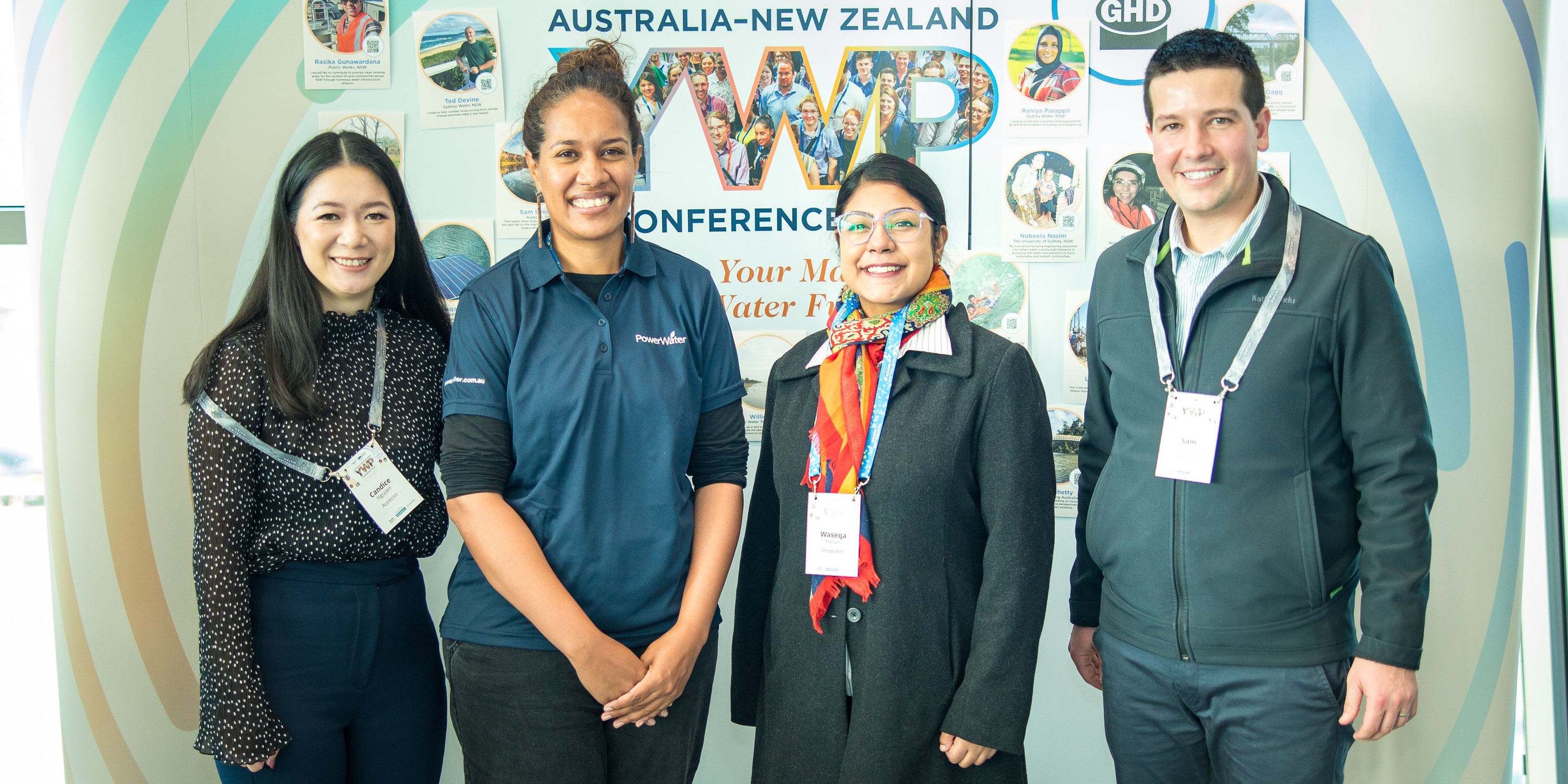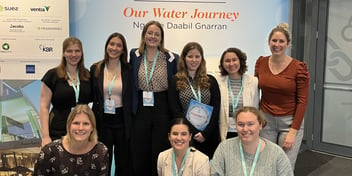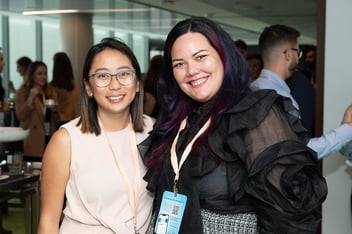Diversity Scholarship recipients report on the YWP Conference

Candice Nguyen, Aurecon; Hmalan Hunter-Xenie, Power and Water Corporation; Waseqa Hasan, Seqwater; and Sam Skinner, Aurecon
AWA, with the generous support of Aurecon, was able to provide two fully funded scholarships for individuals from diverse backgrounds to attend the AWA/IWA Australia-New Zealand Young Water Professional Conference on 29 and 30 June at ICC Sydney. To be eligible, applicants had to identify as coming from a diverse background, be in their final year of undergraduate studies or be a recent graduate with under five years’ experience, and be either pursuing or intending to pursue a career in water in engineering or advisory services.
The scholarships were awarded to Waseqa Hasan and Hmalan Hunter-Xénié, who wrote about what they learned from the conference below.
Waseqa Hasan
I was awarded the Young Water Professional (YWP) diversity scholarship to attend the Australian Water Association (AWA) Australia/New Zealand YWP Conference held in Sydney, from 29-30 June 2022. The theme of the conference was “Leave your mark on our Water Future” which was further encouraged by the presentations, panellists and workshops held over two days. For me, this experience was vital in terms of my own professional development and interpersonal relationships within the water industry. My experiences below highlight how the messages and learnings from this conference will shape my water future.
A notable experience from the conference was the day one keynote speaker, Simon Roberts (Aurecon) who won the Australian Water Professional of the Year in 2021. He began with an exercise for attendees to reflect on the moment which inspired interest in the water industry. This exercise by Simon was a very powerful tool and set the tone for the rest of the conference. During his speech, he spoke about all the contributing factors in his life which led him to take the path. The key message for attendees was to rely on your internal values, continuously reflect and create positive change throughout your professional journey.
In terms of my technical learnings, Session 5 – Building Resilience was a topical session given my profession as an Energy Advisor for Seqwater. In particular, the Looking Left and Right: Understanding ‘Scope 3’ Emissions and How to Reduce Them presentation from Josh Stevens (EY). He highlighted that Scope 3 emissions can be mitigated from water utilities through collaborations within the supply chain to support a net-zero future. My current role is focused on achieving a carbon net-zero horizon for 2030, including a reduction in Scope 2 emissions from electricity. The exercise from this presentation should be considered for future strategic initiatives. The mark I wish to leave on the water industry is to create a carbon-neutral treatment system that supports the use of renewable energy and circular economies. Session 5, while focused on building resilience, was pivotal for me to learn more to achieve a future where the mark I want to leave is indeed viable.
Another memorable experience was the panel discussion from day two, Session 14 - Unpacking Continuing Professional Development Outcomes and Approaches for Water Professionals. The panel was led by Associate Professor Brian Mcintosh (Griffith University, International Water Centre) who led the discussion on how professional development shaped their career. Simon Roberts was also on this panel and discussed the relationship he built with his first mentor. The second panellist, Zhiyao Yang (UQ), spoke about her experiences migrating as a young research professional from overseas.
Dr Annette Davison (The Water Risk Doctor) spoke about her journey as a young professional while combating the after-effects of an unsupportive environment and ongoing social anxiety. The panel was concluded by Kristy Good (NSW Department of Planning Industry and Environment), who discussed balancing professional development during drastic life changes. The main takeaway from this experience was to trust your process in your journey and to refrain from comparison with others. Another takeaway was the importance of asking for help and supporting your peers in their professional development. These are lessons that I aim to take onboard with my involvement in the Young Engineers Australia Committee.
Overall, the YWP Conference this year was integral to my professional development as an engineer in the early stages of my career. It was a great opportunity to discuss different trends between Australian and New Zealand utilities and water businesses. Moreover, I have created networks transcending boundaries and I hope to foster these relationships as I continue to progress in my career. I would like to extend my gratitude to the AWA and the YWP committee for allowing me the opportunity to attend the conference through this scholarship. I would also like to thank the Energy team at Seqwater, Garth Williams, Nayim Kabir and Luke Hellowell for their ongoing support of my professional development. I will continue to recommend to all water professionals to the YWP Conference as it was an invaluable experience.
Hmalan Hunter-Xénié (Tiwi/Iwaidja, Kaytej/Warlpiri and Drehu)
I am an Indigenous female STEM professional. I graduated from the Australian National University (ANU) in June 2020 with a Bachelor of Science (First Class Honours) specialisation in Environment. I work at Power and Water Corporation based in Darwin. I am in the Remote Hydrogeology Team.
Being awarded a Diversity Scholarship allowed me to attend the 2022 Australian Water Association Young Water Professional Conference in Sydney. It was a great opportunity to meet other graduates and early career researchers. I am glad my Manager, Chris Seccull, encouraged me to apply.
I especially enjoyed the presentation by Toni Henderson on the mobile PFAS treatment unit De-Fluoro. Katherine, ~300kms south of Darwin, has the largest PFAS treatment plant in the Southern Hemisphere. This is only a recent development. For this reason, I listened with interest to how different technologies can remove PFAS from drinking water supplies. I wondered if a smaller unit like the one Toni described could be used in remote Aboriginal communities if the need arose.
On the topic of potable water supplies in Aboriginal communities, a second presentation that caught my attention was by SOURCE Global employee Caitlin Fisher. Caitlin mentioned the water woes at Yuelamu. I had visited Yuelamu only months before with my Supervisor, Senior Hydrogeologist Kate Hyland. The situation then was dire but has greatly improved. Water security in arid zones will always be a concern. Therefore, I appreciated the results shared regarding hydropanels—that a single panel can provide around 6-7 litres per day.
For my contribution to the Story Board, I mentioned that I would like water plans to better include Indigenous water stories. Listening to the virtual keynote address by Troy Brockbank was empowering. It helps me see how cultural inclusivity and water are being approached in Aotearoa. I shared the six principles of Te Mana o te Wai with others. Globally many indigenous cultures seem to share a common ideology about talking ‘to’ and ‘with’ water instead of talking ‘about’ water. In my career, I will continue to promote this. I will remind people of our roles, whether Indigenous or non-Indigenous, to speak and do what’s in the best interest of water. In doing so, decisions will be in people’s best interest too.
Sadly, there appeared to be low attendance by Indigenous STEM professionals at the conference. I was not entirely surprised but continue to be slightly disheartened. I am actively trying to change this by encouraging Indigenous STEM students. While at university I tutored Indigenous undergrads as soon as I was eligible. Now that I am working full-time I made it a requirement for my employer to have a reduced workload. I choose to work 0.9FTE and have a rostered day off each week. Doing this enables me to keep tutoring casually. In addition to this, I informally mentor Indigenous cadets, trainees and apprentices coming through Power and Water Corporation. I am a committee member of ANU’s Institute for Water Future’s Indigenous Scholars Program and am a founding member of the National Indigenous STEM Professional Network initiated by the Australian Academy of Science. In the next five years, I plan to use my expanding networks to share relevant events with a growing Indigenous STEM professional cohort.
On the last day of the conference, it was wonderful to witness the success story of Wara Paring. The collaboration by Wara Paring is a testament to how progress is being made to change the status quo. A popular comment made to the panel was regarding roles for women. Female representation in STEM is low and Indigenous women in STEM are even lesser so. It will be great to see how the water industry responds to this inequality. I hope future conferences continue to promote the success stories of Indigenous peoples and communities in Australia and Aotearoa.
AWA thanks our YWP Supporter Aurecon for their generous support with this scholarship.



